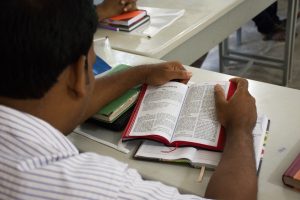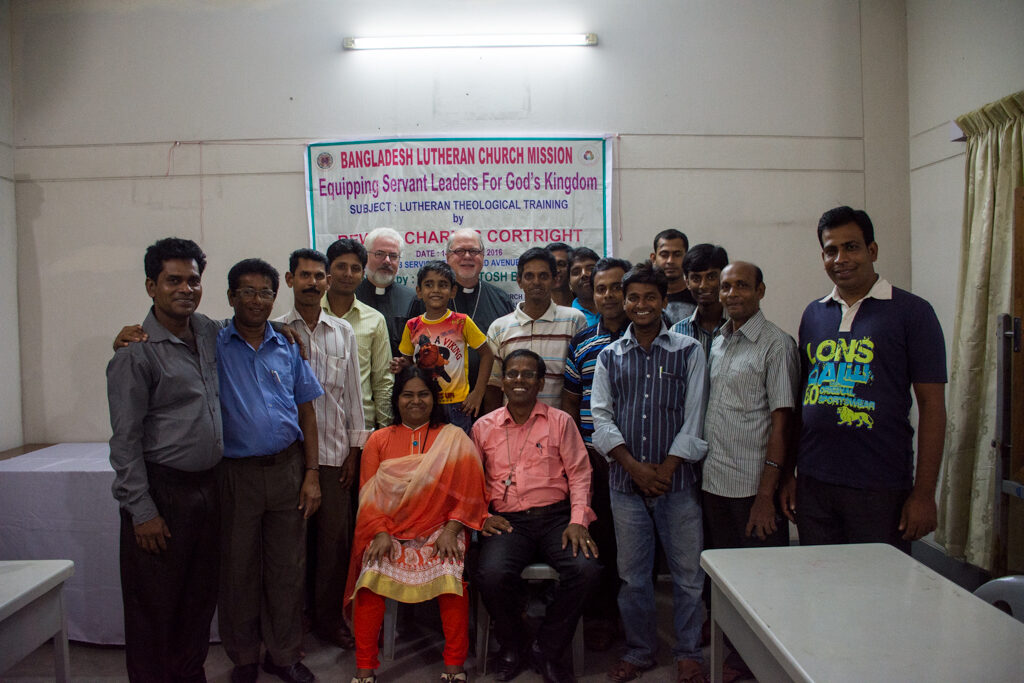The Rev. Dr. Charles Cortright traveled to Asia Aug. 5 to 20 to teach at the invitation of The Lutheran Church—Missouri Synod (LCMS), Office of International Mission (OIM), Asia. He taught in two different countries that illustrate both the challenges and joys of theological education abroad.
Lutheran Theological Seminary, Baguio City, Philippines
Cortright first traveled to Lutheran Theological Seminary, Baguio City, Philippines, where he taught Romans 1–8. The Lutheran Church in the Philippines (LCP) is an established partner church of the LCMS. LCP President Rev. Antonio Reyes recently signed a protocol agreement with the LCMS President Rev. Dr. Matthew C. Harrison.
The LCMS has supported work in the Philippines for the last 70 years. The recent trip, sponsored by the LCMS, shows how the renewed relationship between the two church bodies can help provide theological education for the pastors and people of the LCP.
The class was attended by second and third-year seminary students, faculty of the seminary and pastors of the LCP. The Rev. Charles Ferry, LCMS area director for Southeast Asia, noted the great privilege it was to attend the seminar: “The LCMS has a long history with the Lutheran Church in the Philippines, and it’s both humbling and encouraging to see them continue to look to us for assistance and teaching.”
Cortright noted a number of encouraging strengths about Lutheran Theological Seminary. He said that it was “a pleasant surprise to be able to deal with and refer to the Greek phrases, grammar and verb forms.” He especially noted that “the level of theological maturity of the students and seminary in general was impressive.”
Along with Ferry, Cortright thanked Seminary Dean Rev. Teodorico L. Taran for his willingness to cancel classes for seminary students so that they could attend the lectures on Romans 1–8.
LCP Vice President Rev. Felipe Ehican thanked God “that The Lutheran Church—Missouri Synod was able to send a professor to help in carrying the load of our seminary instructors and professors for the theological development of students and pastors of the Lutheran Church in the Philippines.”
Taran noted how the class demonstrated the important connection between the LCMS and the LCP. He further said that “gaining new insights and emphasis from the study with Dr. Cortright on Paul’s Letter to the Romans meant that Biblical studies is a continuing process for church workers.” On the whole, receiving instructors from other cultures helps the students in numerous ways, he said. The course helped the LCP “grow together in the field of teaching God’s Word to our future pastors and church workers.”
Dhaka, Bangladesh
After Baguio, Cortright traveled to Dhaka, Bangladesh, where he taught the deacons, teachers, and pastor of the Bangladesh Lutheran Church Mission (BLCM). “Dhaka has been great contrast in setting,” Cortright said.
The Rev. Monotosh Banarjee founded the BLCM in 2009. Through Christ’s blessing, it has since grown to 10 congregations with 1200 souls. They also administer seven schools with an enrollment of around 530 students.
Monotosh expressed his gratitude for the opportunity to hear Cortright teach on Romans. As a newly founded church, they have much to learn about Lutheran doctrine and practice. The BLCM is eager to receive this deposit of the faith.

He especially noted the importance of this seminar for students: “It is very helpful for our deacons, evangelists and coworkers to gather knowledge about righteousness from God through faith in Christ Jesus. It is a very important teaching. Most of our church and school workers recently came from other religions. So this training has helped them understand their individual faith in Christ.”
The Rev. Roger James, LCMS area director for South Asia, said: “Theological education is the most important thing the LCMS has to offer in many places, but especially here in Bangladesh.”
As the BLCM matures, “it is especially important to provide theological education at this time,” James noted. “Short term theological seminars, while not ideal, provide a good and necessary means of educating the BLCM.”
Cortright: One Class, Two Contexts
These two distinct contexts offer challenges to an instructor, who must tailor the classes to the different needs of the students. For example, in Baguio, conference attendees knew English, had some training in Greek and had attended at least one year of Lutheran seminary training. A number of the attendees were pastors and professors.
In Dhaka, many of the deacons and evangelists of the BLCM have little formal training in theology. They have no knowledge of Greek, and the entire class had to be translated into Bangla.
Cortright noted “the relative difference in terms of the two churches. … The LCP [has] a very mature pastoral training program, whereas in Dhaka we are dealing with a very different range of teaching and understanding of Bible and Lutheran teaching.”
The Rev. Dr. Daniel Jastram, theological education facilitator for Asia, noted that “through events like this, the LCMS is able to enrich theological education worldwide in a lasting way.”
Short-term, international seminars change both the student and the teacher: “For the stateside participant or leader, it can transform one’s contextual understanding of the Gospel — seen as reaching far across the world, even to a radically foreign culture,” Jastram said. “In regard to the influence they have on others stateside, it can transform the manner in which the leader or teacher conveys to students and members of the Church in their own culture the significance and joy of spreading the Gospel to those of another culture.”
And yet, the primary purpose of such classes is to foster “foreign participants or leaders” so that “they understand their own identity as foreign Lutherans, especially in their own context of persistent ecumenism and unionism within the church.” For Jastram, Lutheran identity remains key: “In regard to the influence they have on others, these events can provide greater clarity in the communication of Lutheran identity as students and pastors apply that Lutheran doctrine and practice to their own culture.”
Cortright noted especially the great privilege it was to teach for the BLCM in Dhaka: “Even after concerns regarding the recent assaults in Dhaka, I would like to assure people that this is a place we need to be, as different as it is in terms of the setting. I am very happy to have come.” He added, “I admire the bravery of Christianity and Christians who are so unabashedly public with their profession of Christ.”
The hunger for faithful Lutheran teaching and practice was no less evident in Baguio. Ferry said of the attendees in Baguio, “They are eager to learn, and hungry for solid, distinctively Lutheran instruction, both for their seminarians and as continuing education for their pastors. They trust the LCMS will provide sound doctrine, but are also grateful for the ongoing relationship and fellowship between our churches.”
While seminars of this type cannot replace residential seminary education, this seminar did give Cortright the opportunity to teach on the centrality of justification, Law and Gospel and the Sacrament of Holy Baptism. While attendees in Baguio were able to dig more deeply into the theology they are studying in class, the conference served as an excellent introduction to these teachings for those in Dhaka.
In both contexts, the Word of God was deeply planted through the faithful teaching of Cortright. The Asia region of OIM continues to seek opportunities to provide theological education within the region.
You can also listen to Dr. Cortright discuss the opportunity he had to teach here as well. Click here to support the work of the Christ through Dr. Cortright.
The Rev. Roy S. Askins is the director of communications for the Asia region of the Office of International Mission.
